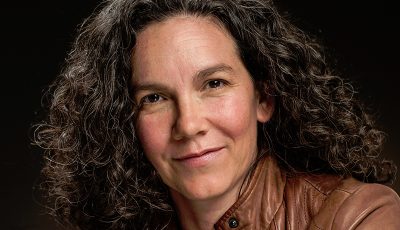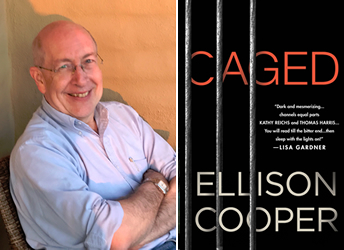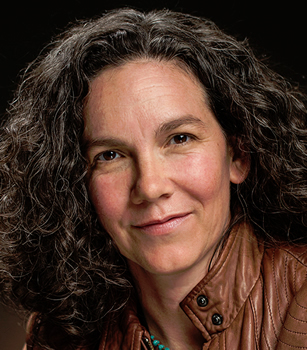

Neil Nyren Spotlight: Ellison Cooper
When an Idea Strikes Like Lightning
 CAGED is not your typical serial killer novel.
CAGED is not your typical serial killer novel.
“A few years ago,” says Ellison Cooper, “I was looking for something to read and jokingly told my partner that I wished there were a crime thriller that incorporated neurology, archaeology, and dogs. It was like being struck by lightning. I couldn’t boot up my computer fast enough.”
The book features an FBI Special Agent named Sayer Altair, a woman with the FBI’s Critical Incident Response Group, responsible for investigating such events as school shootings, random gunmen, and serial killings. But her interest in the latter is very particular—she is also a neuroscientist studying the neurology of violence. Is it possible to pinpoint something specific in the brain? Is there any way to predict what may happen and intervene early?
Unfortunately, the case before her is anything but predictable—a series of kidnappings and deaths that seem to intermingle ancient myths and practices with the most modern of genetic technology. Every time she and her colleagues think they have a handle on what’s happening, events veer off-course, often wildly. The team is confounded, and so is the reader, until the very end.
But “neurology, archaeology, and dogs?” How did the author hit on that combination?
It’s a long story.
Ellison Cooper started out to become a lawyer, but then two major life events of her own intervened. She became a murder investigator, and she fell in love with anthropology.
“With nothing but my admission letter to Georgetown Law School, a deep well of idealism about the criminal justice system, and a laminated card declaring me an investigator, I set out into the worst neighborhoods of Washington to investigate Class 1 Felonies. This was in the early ’90s, when D. C. was considered the murder capital of the United States. Over 450 mostly gang-related murders were committed the year I showed up to work as an intern (basically the legal equivalent of a private investigator) for the Public Defender Service (PDS).
“Then the summer before I began law school, I volunteered on an archaeology project documenting Anaszazi rock art in Grand Gulch, Utah. I loved every second of my time there, and I remember sitting in my contracts class in law school fantasizing about being back out in the canyon scouting for long-hidden petroglyphs. Between that and my time at the PDS, I realized I did not in fact want to become a lawyer (much to my family’s eternal disappointment). I dropped out and, a few months later, talked my way onto an academic project in the jungles of Belize. While there, I learned to expertly wield a machete, killed many fer-de-lances (called the two-step-snake, because you’ll only take two more steps after you’re bitten), lived in a tent without electricity or running water, and got to scout and map Mayan ruins lost in the jungle for hundreds and hundreds of years. My time in Belize changed my life, and I realized that I didn’t want to spend my days in an office behind a computer (and yet, I became a writer, oh the irony).”
Cooper didn’t actually intend to become a writer, either, though. She earned her PhD in anthropology, and got her dream job as a tenure-track professor at a small liberal arts university—and that’s when a third major life event changed everything again.
“This is still something that’s difficult for me to talk about. Not long after my son was born, he got quite ill. I was an assistant professor at the time and quickly realized that my husband and I couldn’t both work full-time and make sure our son got the care he needed. When my husband got a job offer in California that could support us both, I decided to quit and become a full-time caregiver.
“I ended up spending a lot of time in doctors’ offices and therapist waiting rooms. To stave off intense boredom, I began writing. Nine years later, my son is doing wonderfully and I have found that I love writing even more than I loved being a professor. Talk about a silver lining from a very difficult situation.”
Perhaps predictably, however, the process of becoming a writer was yet another path littered with detours and pitfalls.
“I dove straight into a novel and got about halfway through before I realized that I had no idea how to write fiction. All of my experience was with academic journal articles and it turned out that, shockingly, writing fiction is very different. Ha! I had no idea how to craft a story or create compelling characters. I didn’t have time or money for writing classes, so I focused on short stories. I gave myself permission to just have fun and write all kinds of stuff—historical fantasy, hard science fiction, cloak-and-dagger mysteries. Something about the freedom of short stories helped me find my voice.
“Once I thought I had a better grasp, I dove back into another novel. I completed a truly mediocre adult fantasy story, and even though I knew it wasn’t very good, I queried well over 100 agents before accepting that I still probably had work to do on my writing. I began at least 10 other novels before I came up with the premise for CAGED. Something about it felt different from the get-go. My voice, my characters, my background, and the story all just gelled. I realized that the key was to have fun! I suspect one of my ongoing struggles as a writer will be finding the right balance between my very systematic, over-organized nature, and the need to let myself go.
“Once I finished CAGED, my second agent query round was completely different. I sent out five test queries and got five full requests. I sent out about 20 full manuscripts and ended up with the most amazing agent at the most amazing agency (Amy Tannenbaum at Jane Rotrosen). Amy and I worked on CAGED for a few editing rounds, and she sent it out on submission. About two weeks later, it sold at auction to the incomparable Leslie Gelbman at St. Martin’s Press. I am still pinching myself because none of this feels quite real. It almost feels like I woke up with a different life, and I’m just overwhelmed with gratitude that things have worked out this way.”
What does she mean by her “very systematic, over-organized nature?”
“White boards! They’re my addiction. You know that scene in every serial killer TV show when they find the killer’s lair and he has a wall covered with creepy photos connected with a web of string? That’s my office now…
“When I began writing CAGED, I splurged and bought two big white boards. At the time, it felt extravagant, but as I wrote, I kept filling them to the edges. I would take a photo, then erase and start over. Finally, it occurred to me to buy more white boards.
“I just finished the second book in the Sayer series, and I really let my Type A inner white-boarder go wild on this one. Now I create separate boards for anything I’m trying to keep organized in my mind. I’ve realized that I need those visualizations to act as sort of bumpers to guide the story without being a step-by-step outline of events. Basically, it’s a few months of obsessively white-boarding ideas, relationships, locations, arcs, etc., and then I can careen wildly forward within the confines of those concepts. Having those boundaries really allows me to follow the story where it wants to go without losing sight of the larger story I want to tell. I dream of one day covering an entire wall with white board paint so I can just use the whole damn thing.”
Her organized nature even extends to her own name. Ellison Cooper is a pseudonym. “I decided to use a pen name for a few reasons. Mainly, my real name sucks as an author name. It’s long and hyphenated, neither of which lends itself to being particularly memorable. I also have quite a few academic publications under my real name and didn’t want to confuse anyone. Finally, I wanted at least a thin layer of separation between my real identity and my fiction. If I ever do go back to teaching anthropology, I’m not entirely sure I want my students reading my serial killer novels.”
Her “real identity,” though, infuses everything she has written, all her experiences and interests and investigations:
Her time with the Public Defender Service: “While I learned a lot about the criminal justice system—that the adversarial system can be genuinely adversarial, that actual investigations are mostly mundane drudgery punctuated by moments of abject terror, that the people who make the system run are blazing icons of idealism on all sides of the fence—what stuck with me the most was that investigating murder is an inherently heartbreaking, gut-wrenching job. When I’m writing about anyone involved, from witnesses to victim families to the police and lawyers, I try to remember the emotional toll any murder has on the people caught up in the investigation.”
Her explorations in anthropology: “I lived in Belize on and off for nine years, and also conducted research in London and West Africa, but the most meaningful project I worked on was in Yap, Micronesia. The elders of the village of Ka’day asked me and my partner at the time to help them document and map the remnants of their pre-colonial village. The elders were worried that the legends and stories of the house mounds and community buildings would be lost, and I am so proud to have been able to help them preserve that for future generations. None of that research will ever be published, it all belongs solely to the village and is held at the community center there. My ideas about cultural heritage were formed in Micronesia, and I very strongly believe that preserving cultural history is an essential human right. That is definitely something I explore in my writing.”
And the dogs? Cooper is also a volunteer with Wilderness K9 Search and Rescue. “It was something I had always wanted to do, but it wasn’t until I adopted my dog, Shadow, that I actually got serious about it. When I started, I already had a lot of cartography, wilderness survival, and basic medical training, all of which is useful in search and rescue. I joined up with a local SAR group that had a really well-organized training program which allowed me to get all kinds of certifications (swift water rescue, Federal Disaster Worker for the Incident Command System, etc.). Though some larger cities have dedicated K9 units, most SAR teams are called upon by local police departments when they need assistance. SAR people (and dogs) are just some of the nicest, most dedicated people out there, and spend huge chunks of their free time working to help their communities.”
As for her literary influences, she singles out three: Lisa Gardner (“My writing hero. It was actually after reading Live to Tell that I decided to write a crime thriller myself. Something about that book was so emotionally devastating yet also thrilling, and it made me want to emulate that intensity”); Kathy Reichs (“Like me, she has a PhD in anthropology. The way she has managed to take her own background and transform that into one of the best crime series out there is so inspirational”); and Michael Connelly (“Sayer was inspired by Harry Bosch. I love reading about people like Bosch who are far from perfect, but you know that they are driven by a code of conduct.”).
You can see the direct effects of those influences all throughout CAGED, and I expect we’ll see them in the Sayer Altair adventures to come. “Right now, I’m editing Book 2 and starting research for Book 3. In true Type A fashion, I actually have the plots outlined for the next 10 books, so I’m hoping people enjoy the Sayer series enough that I will get to keep writing them!”
Something tells me that won’t be a problem.
ABOUT ELLISON COOPER
Ellison Cooper has a Ph.D. in anthropology from UCLA, with a background in archaeology, cultural neuroscience, ancient religion, colonialism, and human rights. She has conducted fieldwork in Central America, West Africa, Micronesia, and Western Europe. She has worked as a murder investigator in Washington DC, and is a certified K9 Search and Rescue Federal Disaster Worker. She now lives in the Bay Area with her husband and son.
Photo ©Michael Soo
*****
Neil Nyren retired at the end of 2017 as the Executive VP, associate publisher and editor in chief of G. P. Putnam’s Sons. He is the winner of the 2017 Ellery Queen Award from the Mystery Writers of America. Among his authors of crime and suspense were Clive Cussler, Ken Follett, C. J. Box, John Sandford, Robert Crais, Jack Higgins, W. E. B. Griffin, Frederick Forsyth, Randy Wayne White, Alex Berenson, Ace Atkins, and Carol O’Connell. He also worked with such writers as Tom Clancy, Patricia Cornwell, Daniel Silva, Martha Grimes, Ed McBain, Carl Hiaasen, and Jonathan Kellerman.
He is currently writing a monthly publishing column for the MWA newsletter The Third Degree, as well as a regular ITW-sponsored series on debut thriller authors for BookTrib.com, and is an editor at large for CrimeReads.
This column originally ran on Booktrib, where writers and readers meet:
- THE GOD IN THE SEA with Paul Kemprecos - April 4, 2024
- FOR WORSE with L. K. Bowen - April 4, 2024
- HIT AND RUN with Vincent Zandri - April 4, 2024


